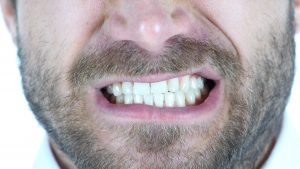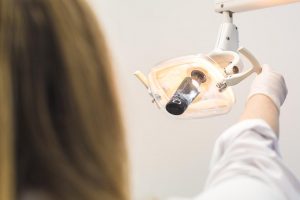Q: My husband grinds his teeth at night. Sometimes it drives me out of the room. What can we do?
A: The good news is that, yes, there are steps that can help your husband with his—and your—problem. The technical name for your husband’s condition is bruxism. Some experts estimate that as many as 10 percent of the population deal with this grinding. And that includes children right through the elderly.
The habit is not necessarily confined to nighttime. People who grind their teeth in their sleep generally have no idea they’re doing it. And they may wake up feeling fine. Others, however, wake with some combination of jaw, shoulder and neck pain. Bruxism also can significantly wear teeth and loosen them. In severe cases, it can crack tooth enamel and chip or break teeth. During sleep, bruxism can cause a person’s jaw to clench at a pressure up to six times greater than the pressure during waking hours.
Causes of bruxism can vary. Stress, a sleep disorder, an abnormal bite or crooked or missing teeth all can be factors. The best person to talk to if you’re suffering from bruxism is your dentist. Whatever the cause, your dentist will know what step to take to deal with it. If it’s stress, for instance, it’s possible that physical therapy or counseling could help. Muscle-relaxing medication or a nighttime mouth guard, specially fitted by the dentist, may be the answer.
If you, your family or friends need dental care, we would be honored to provide you with state-of-the-art dental care in our modern dental practice. Refer someone you love to someone you trust!
Presented as a service to the community by Doctors Hoover and Yanda,
39 Milford Drive, Hudson, Ohio 44236. 330-650-0360. www.drshooverandyanda.com


 People with Alzheimer’s disease may need some help with basic grooming and dressing tasks, including taking care of their teeth and mouth. As a caregiver, you can help!
People with Alzheimer’s disease may need some help with basic grooming and dressing tasks, including taking care of their teeth and mouth. As a caregiver, you can help! Composite fillings are usually more expensive than traditional amalgam fillings because they require a more sophisticated process, more expensive materials and additional office equipment. Composite materials offer an aesthetic alternative to traditional amalgam materials. Because composites can be bonded to teeth, they provide a better seal against leakage and further decay. As such, people who have previously received amalgam fillings often return to their dentist to have them replaced with composite.
Composite fillings are usually more expensive than traditional amalgam fillings because they require a more sophisticated process, more expensive materials and additional office equipment. Composite materials offer an aesthetic alternative to traditional amalgam materials. Because composites can be bonded to teeth, they provide a better seal against leakage and further decay. As such, people who have previously received amalgam fillings often return to their dentist to have them replaced with composite.
 Researchers have observed that people with gum disease (when compared to people without gum disease) were more likely to develop heart disease or have difficulty controlling blood sugar. Other studies showed that women with gum disease were more likely than those with healthy gums to deliver preterm, low birth-weight babies.
Researchers have observed that people with gum disease (when compared to people without gum disease) were more likely to develop heart disease or have difficulty controlling blood sugar. Other studies showed that women with gum disease were more likely than those with healthy gums to deliver preterm, low birth-weight babies.